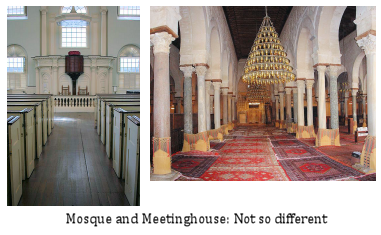
Many Trails to Freedom: Islamic Democracy is not an Oxymoron
“I disapprove of what you say, but I will defend to the death your right to say it.” – Voltaire. Over Christmas I visited Boston and had the occasion to walk the famous freedom trail: 3 miles of sights commemorating American independence. As I walked this hallowed ground I pondered on those fighting for freedom today, in the streets of Cairo, Homs and Tunis. Having met some of these people, I wondered at the suspicion we direct at the Islamic parties now gaining power, as if we forgot our own history. American democracy was born of Puritan principles of self-government, but that did not prevent it from evolving into the (more or less) secular body it is today. Ignoring this …
What Obama didn’t say about Iraq
The Iraq war was not a success. It was a failure. A dismal failure, and Western governments should learn from their mistakes. Of course, nobody can deny the brutal crimes that Saddam Hussein was responsible for. The savage attacks against the Kurdish population in Northern Iraq, the invasion of Kuwait and the terrorising of innocent civilians in the town of Dujail after an assassination attempt serve as prime examples of the sadistic nature of the Iraqi dictator. The world is definitely safer without him, but this in no way outweighs what the world, and in particular the Iraqi people, have had to give up. Transparency International’s most recent Corruption Perception Index (measured in 2010) ranked Iraq as having 175th most …
How the ICC can help Kenya
The ongoing International Criminal Court trial into the so-called “Ocampo Six” is a reminder of how raw the violence around the 2007 Kenyan election remains. It now seems likely that the verdicts on the six won’t be announced until next year – until which time Uhuru Kenyatta, one of those accused of inciting ethnic violence, remains in the post of Deputy Prime Minister. Over 1100 were killed, and had the coalition agreement not come when it did, the spectre of fully-blown Civil War was a genuine possibility. The international community was in shock, having traditionally viewed Kenya as one of the least violent countries in Africa. Really, they shouldn’t have been. A brief history lesson into how Daniel Arap Moi …

Russia-Georgia Relations
There is a lot of talk around Russia-Georgia relations these days. One venue is the current “Geneva Process,” established in 2008 to attempt to sort out the mess created by the Georgian-Russian war. After seventeen meetings, there is no evidence of any significant progress. There is also a substantial array of informal processes involving all kinds of well-intentioned people from London, Washington, Georgia and Russia. They haven’t had any discernible impact either. Outsiders have a substantial interest in the normalization of the bilateral relationship. The situation between Georgia and Russia complicates the Western reset of relations with the Russian Federation. The unresolved conflict between the two obstructs Russia’s accession to the World Trade Organization. Although the situation on the ground …
What does UN Security Council Resolution 1973 permit?
I spent much of yesterday conducting interviews with the media about the situation in Libya. One of the questions I was repeatedly asked concerned the scope of the UN Security Council Resolution 1973 which authorises the use of force in Libya. How far does the resolution permit the coalition now acting in Libya to go? What are the objectives of the coalition military action? Does it permit the targeting of Colonel Gaddafi? The objectives set out by the resolution seem to me to broader than what is commonly thought. Para. 4 which authorises the use of all necessary means (short of an occupation force) is not just about protecting civilians but also, importantly, about protecting civilian populated areas under threat of attack. In other words, that paragraph authorises the use of …
UN Secretary-General HE Mr Ban Ki-moon at Oxford University
His Excellency Mr Ban Ki-moon, current Secretary-General of the United Nations, gave this year’s Cyril Foster Lecture on ‘Human Protection and the 21st Century United Nations’ on 2 February at Oxford’s Examination Schools, hosted by the Department of Politics and International Relations. HE Mr Ban Ki-moon was the 4th Secretary-General of the UN to give a Cyril Foster lecture and he was greeted by an audience of over 700 attendees, including the overflow rooms. From the very early days of his tenure as Secretary General, Ban Ki-moon has placed humanitarian issues, and particularly the notion of the ‘responsibility to protect’, at the forefront of his agenda. More specifically, he has sought to turn ‘words into deeds’ – to translate the …
The Dishonest Broker
The Israeli-Palestinian conflict has been both a major concern of American diplomacy since 1967 and the arena of persistent failure. There are many reasons for America’s failure to broker a peace deal between Israel and the Palestinians but the most fundamental one is that it is a dishonest broker. As a result of its palpable partiality towards Israel, America has lost all credibility in the eyes not only of the Palestinians but of the wider Arab and Muslim worlds. The so-called peace process has been all process and no peace. Peace talks that go nowhere slowly provide Israel with just the cover it needs to pursue its expansionist agenda on the West Bank.









